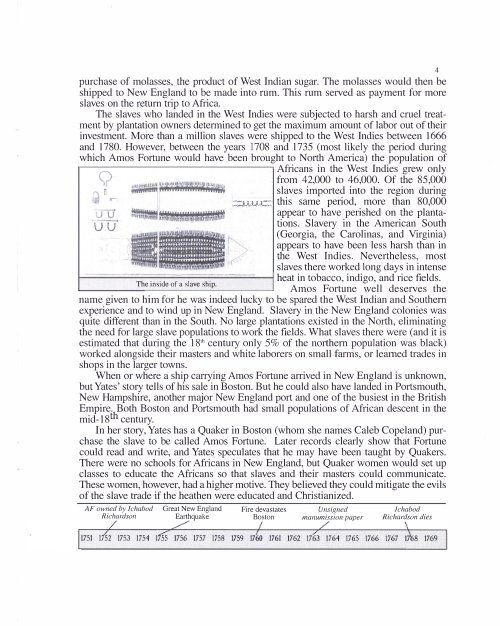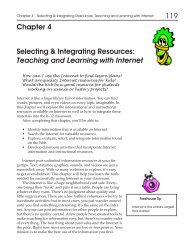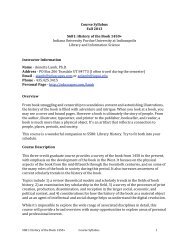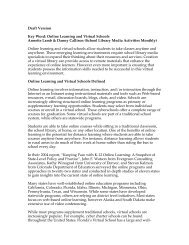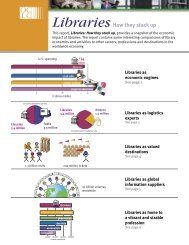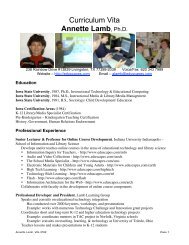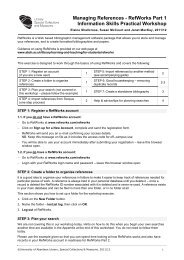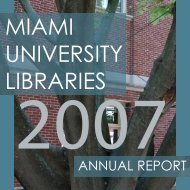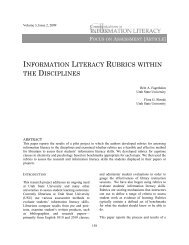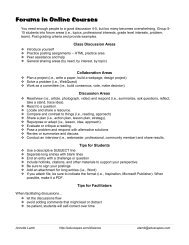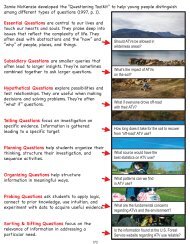Amos Fortune, The Man and His Legacy - eduScapes
Amos Fortune, The Man and His Legacy - eduScapes
Amos Fortune, The Man and His Legacy - eduScapes
You also want an ePaper? Increase the reach of your titles
YUMPU automatically turns print PDFs into web optimized ePapers that Google loves.
purchase of molasses, the product of West Indian sugar. <strong>The</strong> molasses would then be<br />
shipped to New Engl<strong>and</strong> to be made into rum. This rum served as payment for more<br />
slaves on the return trip to Africa.<br />
<strong>The</strong> slaves who l<strong>and</strong>ed in the West Indies were subjected to harsh <strong>and</strong> cruel treatment<br />
by plantation owners determined to get the maximum amount of labor out of their<br />
investment. More than a million slaves were shipped to the West Indies between 1666<br />
<strong>and</strong> 1780. However, between the years 1708 <strong>and</strong> 1735 (most likely the period during<br />
which <strong>Amos</strong> <strong>Fortune</strong> would have been brought to North America) the population of<br />
CfU<br />
'---0<br />
UU<br />
Africans in the West Indies grew only<br />
from 42,000 to 46,000. Of the 85,000<br />
slaves imported into the region during<br />
LtJ=: this same period, more than 80,000<br />
appear to have perished on the plantations.<br />
Slavery in the American South<br />
(Georgia, the Carolinas, <strong>and</strong> Virginia)<br />
appears to have been less harsh than in<br />
the West Indies. Nevertheless, most<br />
slaves there worked long days in intense<br />
I-=====::::==== heat in tobacco, indigo, <strong>and</strong> rice fields.<br />
<strong>The</strong> inside of a slave ship.<br />
<strong>Amos</strong> <strong>Fortune</strong> well deserves the<br />
name given to him for he was indeed lucky to be spared the West Indian <strong>and</strong> Southern<br />
experience <strong>and</strong> to wind up in New Engl<strong>and</strong>. Slavery in the New Engl<strong>and</strong> colonies was<br />
quite different than in the South. No large plantations existed in the North, eliminating<br />
the need for large slave populations to work the fields. What slaves there were (<strong>and</strong> it is<br />
estimated that during the 18th century only 5% of the northern population was black)<br />
worked alongside their masters <strong>and</strong> white laborers on small farms, or learned trades in<br />
shops in the larger towns.<br />
When or where a ship carrying <strong>Amos</strong> <strong>Fortune</strong> arrived in New Engl<strong>and</strong> is unknown,<br />
but Yates' story tells of his sale in Boston. But he could also have l<strong>and</strong>ed in Portsmouth,<br />
New Hampshire, another major New Engl<strong>and</strong> port <strong>and</strong> one of the busiest in the British<br />
Empire. Both Boston <strong>and</strong> Portsmouth had small populations of African descent in the<br />
mid-18 t h<br />
century.<br />
In her story, Yates has a Quaker in Boston (whom she names Caleb Copel<strong>and</strong>) purchase<br />
the slave to be called <strong>Amos</strong> <strong>Fortune</strong>. Later records clearly show that <strong>Fortune</strong><br />
could read <strong>and</strong> write, <strong>and</strong> Yates speculates that he may have been taught by Quakers.<br />
<strong>The</strong>re were no schools for Africans in New Engl<strong>and</strong>, but Quaker women would set up<br />
classes to educate the Africans so that slaves <strong>and</strong> their masters could communicate.<br />
<strong>The</strong>se women, however, had a higher motive. <strong>The</strong>y believed they could mitigate the evils<br />
of the slave trade if the heathen were educated <strong>and</strong> Christianized.<br />
AF owned by Ichabod<br />
Richardson<br />
Great New Engl<strong>and</strong><br />
Earthquake<br />
Fire devastates<br />
Boston<br />
Unsigned<br />
manumission paper<br />
Ichabod<br />
Richardson dies<br />
4<br />
1759 1760 1761


